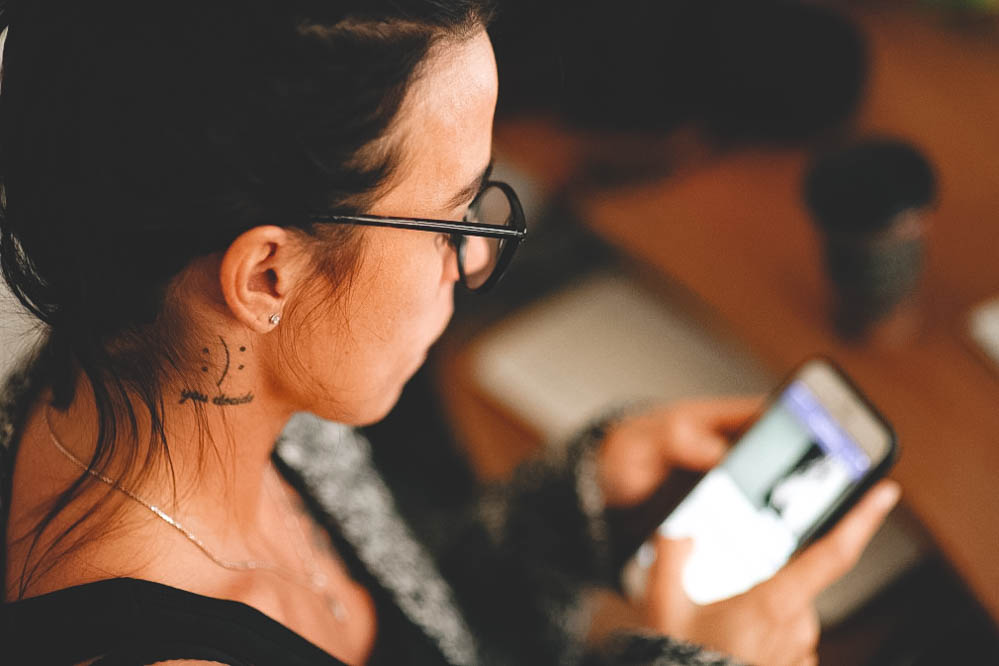Mindfully Consuming Media

Photo by Lelia Milaya
As a society, we are all vastly aware that we are “consumers.” We look at our consumption in a critical view in nearly every facet of our lives. We have “no spend” months and “dry January” we have all sorts of challenges to break ourselves free from various habits. The brave among us have even done “unplugged” challenges and logged out of social media for different periods – a weekend, a week, a month, 90 days, some indefinitely.
Most of us know that our attention becomes a commodity as much as we consume it when it comes to media. Apps, updates, new features for social media platforms like stories, reels, gifs, stickers, music, and beyond…the streaming platforms with every genre of movies and shadows readily available 24/7. In addition to social media movies and tv, we also have podcasts, music news, and ads, all the ads, everywhere, nonstop, customized to us through data. But rather than rant on all the potential evils of technology and our use of it – let’s start a conversation on becoming more conscious consumers of media. Rather than permanently stepping back from our media usage, what if we looked for ways to make it more positively impactful? Not only for ourselves, but for others as well?
Mass Media serves many purposes in our lives; to connect, inspire, entertain, escape, educate and inform. To “mindfully” consume media, we need to be intentional about the content we consume and ask ourselves if it will inspire, inform and motivate us towards our goals? A common saying goes, “you are what you eat…” Let’s apply this to the content we consume daily.
Now, this is not to say some shows or movies can’t just be for “fun.”
But what if what we consume (watch or listen to) encourages us to take action in the areas we are passionate about? What if technology wasn’t used merely as an escape tool but rather to further encourage us in our purpose and pursuits? Or at least to serve as a reminder the world is full of individuals with incredible stories to tell. Stories that can contribute and not subtract from our own.
Movies based on true stories:
- Lion; An Australian couple adopts a five-year-old Indian boy after getting lost hundreds of kilometers from home. Twenty-five years later, he sets out to find his lost family.
- Remember the Titans; The true story of a newly appointed African-American coach and his high school team as a racially integrated unit on their first season.
- October Sky; The true story of Homer Hickam, a coal miner’s son who was inspired by the first Sputnik launch to take up rocketry against his father’s wishes.
- The pursuit of Happyness; A struggling salesman takes custody of his son as he’s poised to begin a life-changing professional career.
- Soul Surfer: Teenage surfer Bethany Hamilton overcomes the odds and her fears of returning to the water after losing her left arm in a shark attack.
- Instant Family; ( Instant Family is based on a true story — or “inspired by a true family,” as the trailer puts it). The movie is based on director and co-writer Sean Anders’ real story of adopting three children out of the foster care system with his wife, Beth.
Documentaries:
Another important category of media for becoming a conscious media consumer is documentaries. While movies based on true stories are inspiring and can highlight various issues in our world and individuals, documentaries are created with a goal in mind to change or improve society in some way and bring light to a specific cause or injustice. They also provide an opportunity to understand and connect with the world and engage in conversations with others.
Several of these films are features of the Justice Film Festival, the premier showcase for films that shine a light on social justice and affirm the dignity of all people. Since 2013, JFF created a platform for redemptive stories of marginalized people and ecosystems bravely overcoming challenges and bringing hope, compassion, and light to a world that needs inspiration. The 2021 9th annual Justice Film Festival will be held November 10th-13th as a hybrid event, both online and in person. Tickets will be on sale on August 10th.
- Fyre Festival; Fyre: The Greatest Party That Never Happened is a 2019 American documentary film about Billy McFarland and the failed Fyre Festival of 2017. This film shines a light on social media-fueled disasters and the big picture of influencer culture.
- 13th; A staggering documentary that tells the story of American slavery and its long-lasting impacts, many of which still resonate today.
- Social Animals; (JFF) A daredevil photographer, an aspiring swimsuit model, and a midwest girl next door are all looking for the same things from their Instagram account -a little love, acceptance, and fame- and they’ll do just about anything to get it.
- Black Boys(JFF); Black Boys reveals the emotional landscape of racism—how it feels to walk through the world seen as something to be feared.
- Birthtime (JFF); Three women embark on a mission to find out why an increasing number of women are emerging from their births physically and emotionally traumatized. Their discoveries expose the truth and lead them to join the birth revolution and forge a movement that hopes to change the face of maternity care in Australia and across the developed world.
- Gather (JFF); Gather is an intimate portrait of the growing movement amongst Native Americans to reclaim their spiritual, political, and cultural identities through food sovereignty while battling the trauma of centuries of genocide.
For a more complete and comprehensive list of thought-provoking and inspiring documentary films, visit https://www.justicefilmfest.com/films.
Consider hosting a virtual or in-person film night with friends this summer/fall to discuss current issues in our world, replacing a binge show with a documentary or movie based on a true story once a week or monthly, and even attending the Justice Film Festival Fall. Our world is full of stories of beauty and struggle and individuals facing problems that need to be seen and heard. We understand our purpose all the more when we better see and understand each other. What easier way to begin than by starting with the media we consume?



